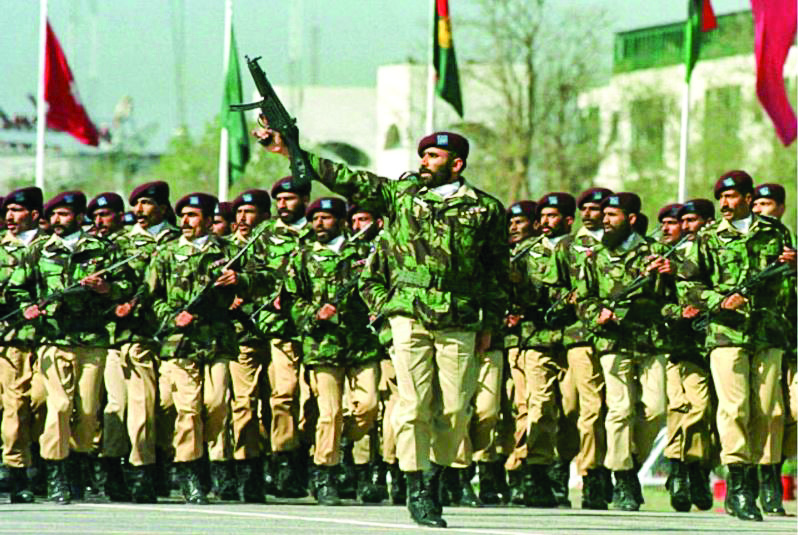The road to recovery is fraught with challenges. The military’s grip on power is deeply entrenched, and resistance to change will be fierce.
NEW DELHI: ‘Year of Pakistan Chaos’ is becoming a rallying cry on social media, encapsulating the frustration and despair of millions of Pakistanis. The nation stands at the edge of an economic precipice: inflation has soared past 38%, GDP growth is stagnating at 2.4%, and over 35% of the population lives below the poverty line.
The causes of this collapse go far beyond traditional mismanagement. At the heart of the crisis is a decades-old phenomenon—the military’s entrenched control over Pakistan’s governance, economy, and resources. This “milbus” (military business) empire has enriched a small elite within the armed forces, while ordinary citizens are left to bear the brunt of rising inequality, economic despair, and deteriorating public services.
MILBUS: THE ENGINE OF INEQUALITY
Over seven decades, Pakistan’s military elite has crafted an economic juggernaut under the guise of welfare and national security. Entities like the Fauji Foundation, Army Welfare Trust, and Defence Housing Authority have built sprawling business empires encompassing agriculture, manufacturing, real estate, and banking. These ventures generate immense profits while enjoying tax exemptions and minimal oversight.
By some estimates, the military controls approximately 12% of Pakistan’s land, including prime urban real estate, allocated primarily to senior officers. This economic dominance operates as a parallel economy, largely insulated from the fiscal realities that ordinary Pakistanis face. For example, while senior officers live in gated communities and opulent residences, the average citizen struggles with skyrocketing food and fuel prices.
COST OF MILITARY DOMINANCE
The unchecked power of the military elite has diverted critical resources away from public welfare. Defence spending consistently consumes approximately 20% of Pakistan’s national budget, leaving sectors like education (2% of GDP) and healthcare (1.3% of GDP) severely underfunded.
The disparity is most evident in resource-rich but impoverished regions like Balochistan. Despite contributing significantly to Pakistan’s natural gas and mineral wealth, Balochistan suffers from a 70% poverty rate and a lack of basic infrastructure. This exploitation has fuelled long-standing grievances and separatist movements, further destabilising the country.
LEGACY OF HYBRID MISGOVERNANCE
Pakistan’s economic woes are inextricably linked to its history of military intervention in politics. Since 1947, the country’s armed forces have positioned itself as the ultimate defender of the nation, using conflicts with India and internal instability to justify its dominance. Nearly half of Pakistan’s history has been marked by direct military rule, with the remainder overshadowed by hybrid governance, where civilian governments operate under the military’s influence.
This system has stifled the development of democratic institutions. Civilian leaders, often reliant on military backing, have been unable to enact meaningful reforms. Corruption and inefficiency in civilian governance have further entrenched public dependence on the military, creating a vicious cycle that prioritises military interests over national development.
ECONOMIC DEPENDENCY ON LOANS AND CPEC
Pakistan’s economic collapse has been aggravated by its reliance on external loans and controversial projects like the China-Pakistan Economic Corridor (CPEC). With external debt exceeding $126 billion and debt servicing consuming over 40% of its budget, Pakistan’s fiscal situation remains precarious.
Initially hailed as a game-changer, CPEC has deepened Pakistan’s economic dependence on China. Projects like Gwadar Port have primarily benefited Chinese stakeholders and the military elite, sidelining local communities. Protests in Gwadar highlight widespread discontent over unmet promises, unemployment, and the exploitation of local resources.
RELIGION AS A TOOL FOR CONTROL
The military’s dominance has been bolstered by aligning itself with Pakistan’s Islamic identity. From General Zia-ul-Haq’s institutionalisation of Islamic conservatism to state-sponsored propaganda portraying the military as the defender of Islam, this narrative has insulated the armed forces from criticism.
Dissent is often equated with disloyalty to the nation and faith, suppressing voices that question the military’s priorities. Even today, the military’s role is portrayed as sacrosanct, despite mounting evidence of its economic and political mismanagement.
A NATION IN CRISIS
The stark inequality between the military elite and ordinary Pakistanis has reached a breaking point. Public frustration is mounting as citizens question why defence spending and elite privileges consistently outweigh investments in their basic needs. The International Monetary Fund’s $7 billion bailout and the World Bank’s $20 billion lending programme provide temporary relief but come with strict conditions requiring reforms that the military is reluctant to implement.
Meanwhile, Pakistan’s youth, burdened by unemployment (approximately 10%) and lack of opportunities, increasingly view migration as their only hope. This brain drain further undermines the country’s future, leaving it ill-equipped to address its economic and social challenges.
DEFENCE AT THE COST OF WELFARE
In 2023-24, nearly 20% of Pakistan’s federal budget was allocated to defence, compared to just 2% for education and 1.3% for healthcare. This prioritisation exacerbates inequality, leaving millions without access to basic amenities.
=Healthcare Crisis: Public hospitals face chronic shortages of medicines and staff, with patients often resorting to private facilities they cannot afford.
=Education: Over 22.8 million children remain out of school, with military-run schools catering primarily to the elite.
REFORM OR RUIN
Pakistan’s survival depends on dismantling the military’s economic stranglehold and rebuilding democratic institutions. Key reforms include:
=Civilian Oversight of the Military: Ensuring that the armed forces adhere to their constitutional role.
=Taxation of Military Enterprises: Redirecting revenues from “milbus” ventures to fund public welfare.
=Equitable Resource Distribution: Addressing regional grievances through inclusive policies.
=Strengthening Democratic Institutions: Promoting free and fair elections and judicial independence.
The road to recovery is fraught with challenges. The military’s grip on power is deeply entrenched, and resistance to change will be fierce. However, without these reforms, Pakistan risks sliding further into economic despair and political instability.
Pakistan’s military elite has profited at the expense of its nation’s future, creating a system where prosperity is reserved for the few while millions struggle to survive. As the country faces unprecedented economic and social challenges, the need for systemic
Ashish Singh is a senior journalist with over 17 years of experience in defence & foreign affairs.

